
The Bolsheviks, led by Vladimir Lenin, were a far-left faction of the Marxist Russian Social Democratic Labour Party (RSDLP) which split with the Mensheviks at the Second Party Congress in 1903. The Bolshevik party, formally established in 1912, seized power in Russia in the October Revolution of 1917, and was later renamed the Russian Communist Party, All-Union Communist Party, and Communist Party of the Soviet Union. The party's ideology, based on Leninist and later Marxist–Leninist principles, is known as Bolshevism.
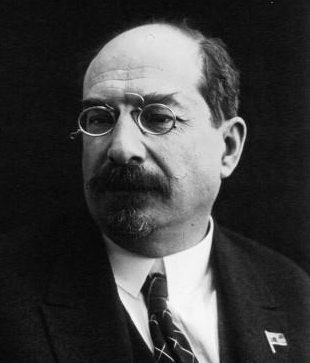
Anatoly Vasilyevich Lunacharsky was a Russian Marxist revolutionary and the first Bolshevik Soviet People's Commissar (Narkompros) responsible for the Ministry of Education as well as an active playwright, critic, essayist, and journalist throughout his career.

Vyacheslav Rudolfovich Menzhinsky was a Soviet revolutionary and politician who served as chairman of the OGPU, the secret police of the Soviet Union, from 1926 to 1934.

Mikhail Nikolayevich Pokrovsky was a Russian Marxist historian, revolutionary and a Soviet public and political figure. One of the earliest professionally trained historians to join the Russian revolutionary movement, Pokrovsky is regarded as the most influential Soviet historian of the 1920s and was known as “the head of the Marxist historical school in the USSR”.

Proletkult, a portmanteau of the Russian words "proletarskaya kultura", was an experimental Soviet artistic institution that arose in conjunction with the Russian Revolution of 1917. This organization, a federation of local cultural societies and avant-garde artists, was most prominent in the visual, literary, and dramatic fields. Proletkult aspired to radically modify existing artistic forms by creating a new, revolutionary working-class aesthetic, which drew its inspiration from the construction of modern industrial society in backward, agrarian Russia.
Yedinstvo or Edinstvo was a faction within the Russian Social Democratic Labor Party (RSDLP) between 1914 and 1917 and then a small independent party in 1917 and 1918. It was led by Georgi Plekhanov.
In the course of the history of the Russian Social Democratic Labour Party (RSDLP between 1898 and 1918), several political factions developed, as well as the major split between the Bolsheviks and the Mensheviks.
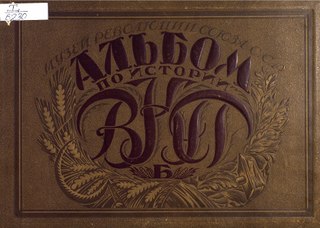
The Fourth (Unity) Congress of the Russian Social Democratic Labour Party took place in the (old) Folkets hus in Stockholm, Sweden, from 23 April to 8 May 1906. This Congress seen the formal, albeit short-living, reconciliation between the Bolshevik and Menshevik factions, hence the word "Unity" in the Congress' name.
Proletary was an illegal Russian Bolshevik newspaper edited by Lenin; it was published from September 3, 1906, until December 11, 1909. A total of fifty issues having appeared. Active participants in the editorial work were Mikhail Vladimirsky, V. V. Vorovsky, I. F. Dubrovinsky, Anatoly Lunacharsky. Alexander Bogdanov had originally been on the editorial board, but he resigned, being replaced by Virgil Shantser on 13 August 1908. The technical side of publication was in the hands of Alexander Schlichter, E. S. Schlichter and others. The first twenty issues of the paper were edited and set up in Vyborg. Later, in view of growing difficulties in the way of publishing an illegal newspaper in Russia, the St. Petersburg and Moscow Committees of the Russian Social Democratic Labour Party decided that publication of the newspaper should be organised abroad. Nos. 21 to 40 were published in Geneva and Nos. 41 to 50 in Paris.

Nikolai Vladislavovich Valentinov was a Russian philosopher, journalist and economist. A member of the Russian Social Democratic Workers' Party (RSDRP), he was an exponent of empirio-criticism. He was also known as Nikolai Valentinov-Volski and, later, as E. Yurevski.

Alexander Aleksandrovich Bogdanov, born Alexander Malinovsky, was a Russian and later Soviet physician, philosopher, science fiction writer and Bolshevik revolutionary. He was a polymath who pioneered blood transfusion, as well as general systems theory, and made important contributions to cybernetics.

Yuliy Osipovich Tsederbaum, better known as Julius Martov, was a Russian revolutionary, politician, and the leader of the Mensheviks, a faction of the Russian Social Democratic Labour Party (RSDLP). A close associate of Vladimir Lenin prior to 1903, Martov broke with him following the RSDLP's ideological schism, after which Lenin led the opposing faction, the Bolsheviks.

The Mensheviks were a faction of the Marxist Russian Social Democratic Labour Party (RSDLP) which split with Vladimir Lenin's Bolshevik faction at the Second Party Congress in 1903. The Mensheviks were led by Julius Martov and Pavel Axelrod.
The Mezhraiontsy (Russian: межрайонцы, IPA:[mʲɪʐrɐˈjɵnt͡sɨ]), usually translated as the "Interdistrictites," were members of a small independent faction of the Russian Social Democratic Labor Party (RSDLP), which existed between 1913 and 1917. Although the organization's formal name was the Russian Social Democratic Labor Party (Internationalists), the names "Mezhraionka" for the organization and "Mezhraiontsy" for its participants were commonly used to indicate the group's intermediate ideological position between the rival Menshevik and Bolshevik wings of the divided RSDLP.
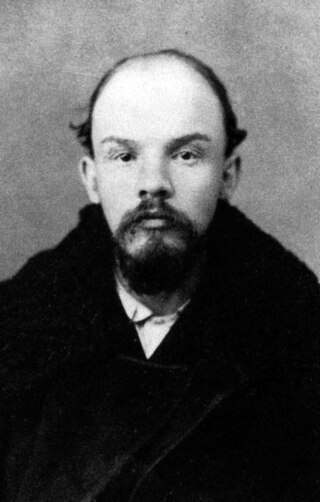
The Russian communist revolutionary and politician Vladimir Lenin began his active revolutionary activity in 1892, and continued till assuming power in the Russian Revolution of 1917. Following on from his early life, during which he had become devoted to the cause of revolution against the Tsarist regime in the Russian Empire and converted to Marxism, Lenin moved to St. Petersburg. There he joined a revolutionary cell, and became a vocal advocate for Marxism within the revolutionary socialist movement. Entering a relationship with fellow Marxist Nadezhda Krupskaya, he toured Western Europe to build ties with other Russian revolutionary emigres and learn more about the international Marxist movement. Upon returning to Russia, he was arrested for sedition in 1895 and exiled to Shushenskoye in the Minusinsky District of eastern Siberia for three years. There, he devoted his time to translating and writing revolutionary texts, marrying Krupskaya in July 1898.
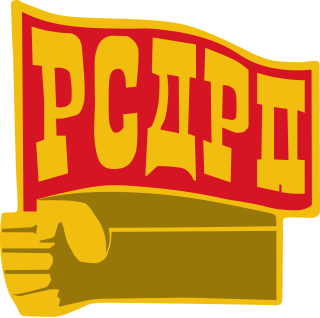
The Russian Social Democratic Labour Party, also known as the Russian Social Democratic Workers' Party or the Russian Social Democratic Party, was a socialist political party founded in 1898 in Minsk.
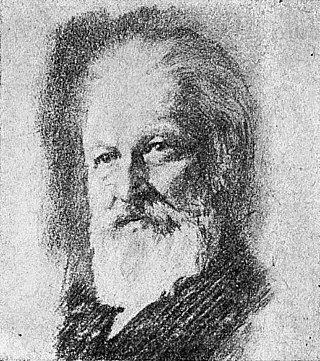
Mikhail Stepanovich Olminsky was a prominent Russian Bolshevik particularly involved with Party history and also an active literary theorist and publicist.

Nikolai Aleksanderovich Rozhkov was a Russian historian who became an active revolutionary in the Russian Social Democratic Labour Party.

An index of articles related to the Russian Revolution and the Russian Civil War period (1905–1922). It covers articles on topics, events, and persons related to the revolutionary era, from the 1905 Russian Revolution until the end of the Russian Civil War. The See also section includes other lists related to Revolutionary Russia and the Soviet Union, including an index of articles about the Soviet Union (1922–1991) which is the next article in this series, and Bibliography of the Russian Revolution and Civil War.
Virgil Leonovich Shantser was a Bolshevik revolutionary active in the Moscow uprising of 1905. He became a leading Bolshevik, but followed Alexander Bogdanov into the Vpered faction in 1909. However he contracted an illness and died in 1911.
















